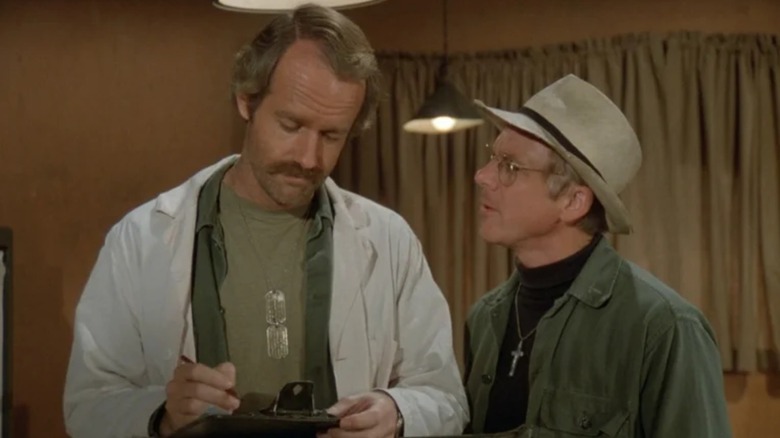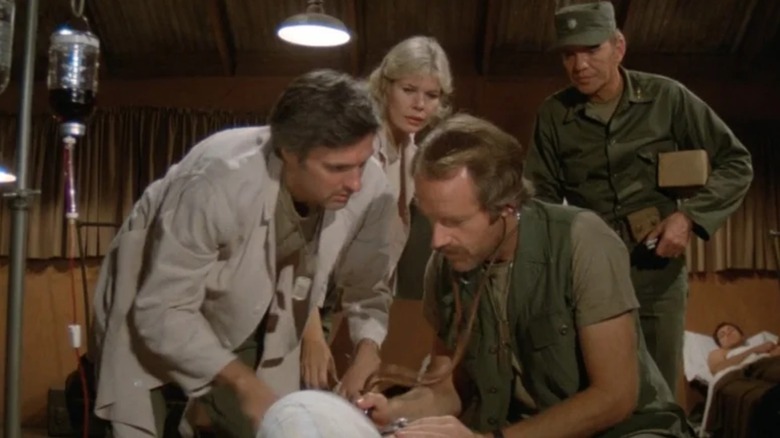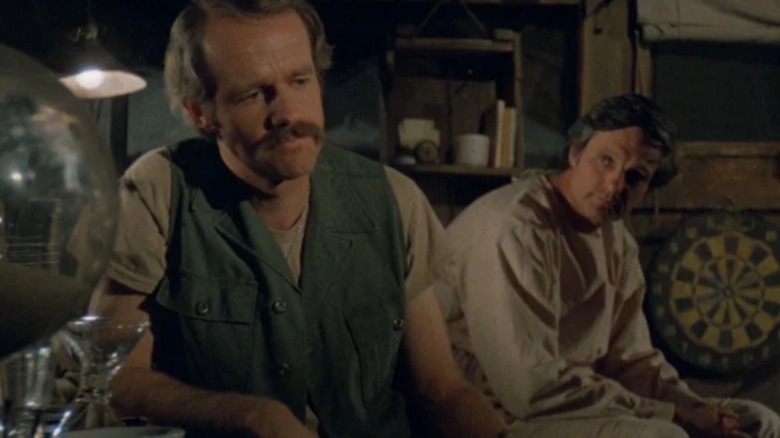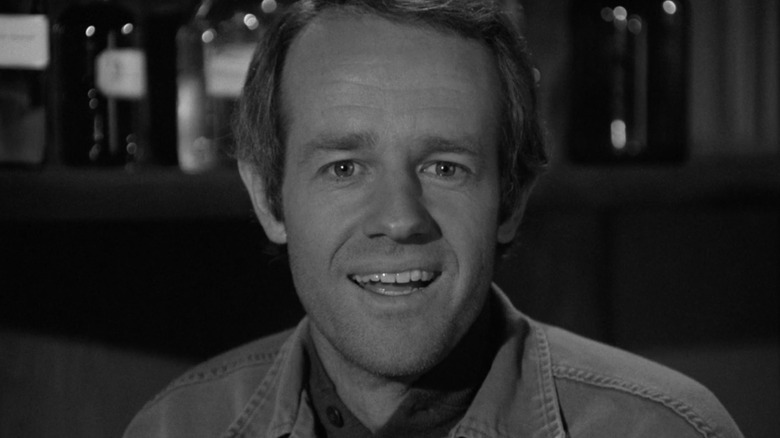How One M*A*S*H Cast Member's Role Carried Over Into Real Life
When it comes to talking about TV shows with a real-world message, actors, writers, and others involved have to walk a fine line between self-deprecating and self-important. Can a show make its viewers better people? Can it actually change the world? These are questions the cast and crew of "M*A*S*H" seem to get asked a lot, as a recent retrospective on the series titled "M*A*S*H: The Comedy That Changed Television" demonstrates.
The special includes commentary from "M*A*S*H" alums who tell stories about the impact the groundbreaking dramedy series had on them personally and on the world at large. In one archival footage scene, someone at a press conference asked actor William Christopher about whether the Vietnam-era show could've changed Americans' opinions about the war. "'M*A*S*H,' in its development, began to deal with social issues, and we all felt that the things we were able to touch on were meaningful," Christopher answered diplomatically, noting that he wasn't the best person to ask about the show's impact.
After all, no one wants to be known as the guy who says his work as an actor saves real lives, right? Except, weirdly, one "M*A*S*H" actor actually did help out an injured patient once, in a strange, stressful case of life imitating art.
Mike Farrell really scrubbed up for an operation
Mike Farrell played surgeon B.J. Hunnicutt for eight of the show's 11 seasons, but on a trip to El Salvador in 1985, the actor's role on TV suddenly got a little bit more real than he expected. According to a news item about the adventure from the LA Times, longtime humanitarian Farrell traveled to the Central American nation after the end of "M*A*S*H" alongside Amnesty International. As an Amnesty representative, he'd planned to keep an eye on an important medical and political moment: Farabundo Marti National Liberation Front member Nidia Diaz, at the time a captive guerrilla leader who'd previously led peace talks opposite President José Napoleón Duarte, was due to receive surgery on her right hand after being shot earlier that year.
Los Angeles humanitarian organization Medical Aid For El Salvador arranged Diaz's surgery after determining that she was not receiving adequate medical care, but when the time came for Farrell to watch the surgery, he was surprised to find out he'd be scrubbing in alongside neurosurgeon Alejandro Sanchez.
Though the actor had no real-life medical training, Sanchez told him to help out with the surgery because, as Farrell put it, Diaz was "too much of a hot potato" to have her care entrusted to local surgical aides. In his autobiography "Just Call Me Mike," Farrell explained that the Salvadorans who had prepped Diaz for surgery walked out when it began, and noted that "the repression by the military was so complete that anyone assisting the enemy, wounded or not, would be considered a traitor and face dire consequences."
All hands on deck
With a strong police presence nearby, Sanchez, Farrell, and Sanchez's wife (a nurse who was administering local anesthetic) worked for over two hours to restore mobility to Diaz's thumb, rebuilding the tendon that he notes she would later use to sign the peace treaty ending the Civil War. Shockingly, Farrell did a whole lot more than simply hand over scalpels. "He said, 'When I say cut, I want you to cut. When I say retract, you retract. You know how to do that?'" Farrell told the LA Times. He later wrote that he also helped cut and reconnect the woman's thumb tendon. He added, "[Sanchez] gave me a book on tendon surgery in the car on the way over."
The actor explained in his memoir that Sanchez had included him in initial assessments of the patient, a gesture that he realized later had been meant to prepare Farrell for the possibility that things might get hands-on in the operating room. When Farrell initially protested the idea of scrubbing in, Sanchez told him: "You understand the process; you know sterile procedure. Without another pair of hands I can't do this, so get scrubbed."
Farrell insisted the doctor tell the patient he had no surgical experience and give her the chance to postpone the surgery — though given how much pressure he says had to be put on governments to allow it in the first place, it's unclear if there would've actually been a second chance. When Dr. Sanchez explained the situation to Diaz, she laughed and, according to his translation, replied, "In the mountains, those who can, do." As if this story isn't wild enough, a power outage hit during the surgery, and though it shook Farrell, Diaz cheered — as it was her guerrilla group attacking their enemies' power grid.
'I know this is going to look like a stunt'
Far from the unshakeable operator he played on TV, Farrell says he was nervous as he prepared. He recalled getting ready in his book:
"So I went into the scrub room and did all the things I'd done hundreds of times before for what felt like the first time, all the while telling myself not to pass out or vomit when the cutting started."
Miraculously, though, the procedure was successful and Farrell passed as a competent enough surgeon despite never having gone to medical school. "I know this is going to look like a stunt," he told the LA Times, "But that's too bad. It isn't." He later wrote that a popular morning show asked him to come on and talk about the excursion, but insisted that someone from the "other side," apparently the Reagan administration, would have to represent a counterpoint. "You mean you want us to debate the right to humanitarian assistance?" Farrell recalls saying in his memoir. "I thought that was pretty well resolved some years back with the Geneva Conventions." You can say that again, Mike.



